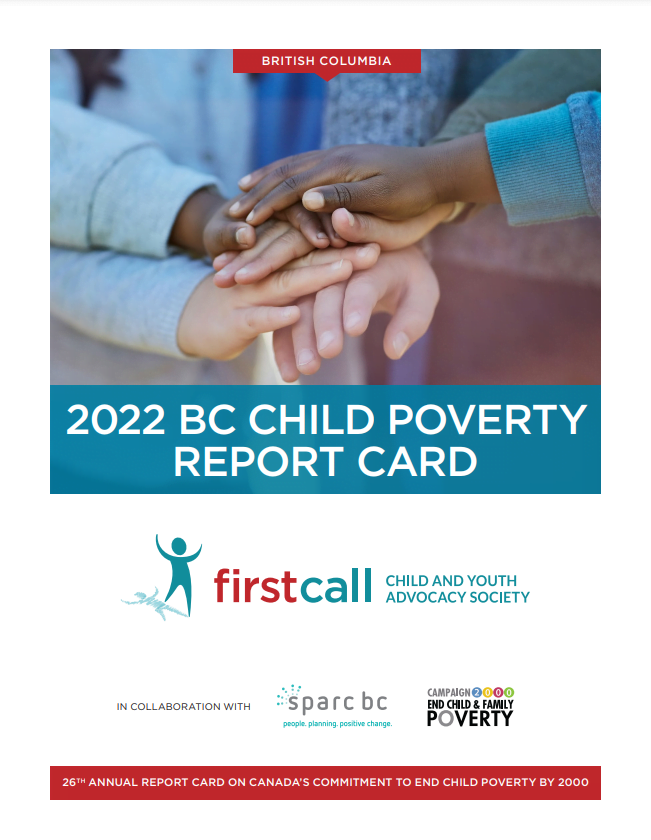10 search results
for
Poverty
Tax fairness and income support
Recommendation 1: Establish a permanent Fair Wages Commission to examine issues related to low wages and precarity in BC to advise government on strategies that bring workers above the poverty line. Make sure all workers in BC are covered by the hourly minimum wage by the end of 2023.-
Category and theme:
Audience:
Groups affected:
Location of recommendation:
Tax fairness and income support
Recommendation 2: Governments at all levels should ensure their direct and contract employees are paid a living wage that allows them to meet their basic needs, properly support their children and avoid chronic financial stress.-
Category and theme:
Groups affected:
Location of recommendation:
Tax fairness and income support
Recommendation 5: Ensure the Canada Child Benefit, in combination with other income measures, raises all families with children above the CFLIM after tax poverty lines calculated through tax filer data and ensure access to this and other federal benefits for families in population groups with higher rates of poverty.-
Category and theme:
Groups affected:
Location of recommendation:
Tax fairness and income support
Recommendation 7: Enhance Employment Insurance to expand access, duration, and level of benefits to reduce inequity for lower-income workers and prevent and reduce child and family poverty, including establishing a minimum benefit floor.-
Category and theme:
Groups affected:
Location of recommendation:
Tax fairness and income support
Recommendation 8: Ensure maternity and parental leave benefits are universally available to all parents (regardless of work status), increase the duration of leave and ensure the benefit levels are not less than the CFLIM after-tax poverty lines.-
Category and theme:
Groups affected:
Location of recommendation:
Tax fairness and income support
Recommendation 9: Address growing income inequality and generate revenue for poverty reduction programs by eliminating or reducing highly regressive and expensive tax loopholes, closing tax havens, taxing extreme wealth and implementing an excess profit tax focused on corporate pandemic windfalls.-
Category and theme:
Groups affected:
Location of recommendation:
Targeted initiatives for groups over-represented in poverty data
Recommendation 10: Collaborate with First Nations, Métis and Inuit governments and Indigenous organizations to address the factors leading to child and family poverty in order to prevent, reduce and eradicate child and family poverty in Indigenous communities. The federal government must comply with the rulings of the Canadian Human Rights Tribunal to provide adequate funding for child welfare services on reserve and ensure the full application of Jordan’s Principle for First Nations children. Federal and provincial governments must ensure culturally safe supports and public services are also provided to Métis and Inuit children and to other Indigenous children living off-reserve in urban centres not covered under Jordan’s Principle.-
Category and theme:
Groups affected:
Location of recommendation:
Lower barriers and improve lives through universal programs
Recommendation 17: Increase investment in public health initiatives aimed to support maternal and parental health and healthy infant development, as well as non-barriered, free, community-based programs and services for all families with young children to ensure these supports are available throughout the province and designed to reach families experiencing poverty and other threats to their ability to thrive.-
Category and theme:
Audience:
Groups affected:
Location of recommendation:
Lower barriers and improve lives through universal programs
Recommendation 18: Scale up funding to build thousands of new social and affordable rental housing units and maintain existing affordable housing stock to reduce the number of families in core housing need and to eliminate homelessness. Tie rent control to the unit to remove the incentive for evictions of current tenants to raise the rent for new tenants.-
Category and theme:
Audience:
Groups affected:
Location of recommendation:
Recommendation 25:
The CFLIM-AT is a broad, comprehensive, and relative measure of poverty. Replace the Market Basket Measure with the Census Family Low Income Measure After Tax (CFLIMAT), calculated with annual tax filer data, as Canada’s and BC’s official measure of poverty.
-
Category and theme:
Groups affected:
Location of recommendation:
